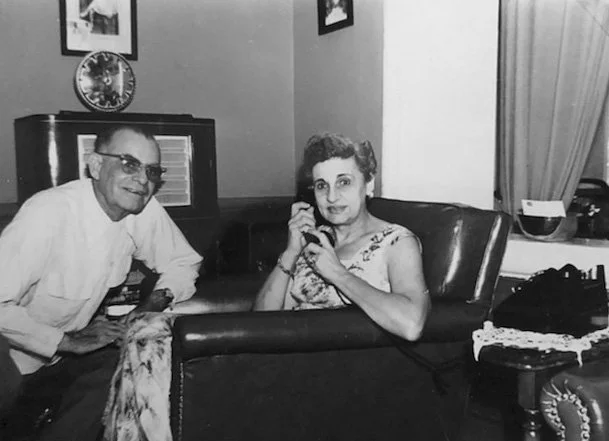The photo is of my Padrino and my aunt Chacha, who was blind. They had no children and were first cousins of each other. Padrino and Chacha lived right next door to us, door to door across a narrow passageway, as if it was one and the same house.
Here is another passage from my fictionalized memoir, House without Doors. Those of you who know my family, note that this is a work of fiction, told in the voice of 12 year old Mira and I have changed names and several of the relationships, so that my fantasy could run wild.
But Didachi is Chacha in every way.
***
(...) Didachi lost her eyesight at the age of thirty, long before I was born. But she knows literature and songs in French and can talk about history and geography. After school, I rush to tell her what I have learned, and I always read her the poems I write, because my own mother, who grew up in Cuba, does not know Dutch very well. I trust Didachi’s knowledge, her wisdom - as if it was precisely her blindness that made her so wise.
Didachi knows where every piece of furniture is in her house. She remembers the exact place of each table, sofa or chair and never bumps into anything. She can sense when something has been moved from its place by a new servant who does not know any better yet, or if Dito and I have been messing around with the chairs. I am always astonished at how she can find her way between the furniture, as her house feels like a complicated maze to me when I close my eyes and pretend to be blind. Yes, Didachi seems to have a sixth sense, the sense of navigation. Like the bats in the stalactite caves of Hato.
When I come to greet her, Didachi says “Mira, let me look at you” and runs her fingers over my face and touches me all over. She is magically able to see that I have shiny black hair and big black sparkling eyes - she simply knows I am pretty. And I believe her, even though she has never seen me with her eyes.
*
(...) Didachi's corner in the inner-sitting-room is like a room with a hearth. Of course you never have to heat the house here in the tropics, but I have read so many books about winter in Holland that I sometimes begin to believe we too have a hearth. That it is cold and snowing outside, while inside the fire is burning. The whole family sits together, very close, warming our bodies as our faces glow. If there would be a hearth anywhere in this house in the tropics, it is obvious that it would have to be right here, in Didachi's corner.
On Saint Nicholas eve we all come together in Didachi's corner to open up our presents. After I stopped believing in Saint Nicholas, I wanted to celebrate that special day the way it is done in Holland, with a poem attached to each gift. So weeks before the Fifth of December I start to write my rhymes - a different one for each person in the family, telling something about the things they like, or hate, or about a funny thing that had happened to them during the year.
Mami does not know Dutch very well, because she had gone to school in Cuba, and she has a hard time following my poems. It is Didachi who enjoys this custom the most and she is the only one of the grownups who also writes poems. She dictates the poems to one of her Dutch friends, who writes them down for her. On Saint Nicholas eve we all come together in her corner and read the poems out loud and afterwards we open up our presents. That is when I always imagine it is snowing outside and we are all sitting together around the hearth.
Several times a week Didachi is “reading” that is, she has a friend come and read to her. Didachi sits in her comfortable brown leather armchair, next to her telephone and her phonograph with records for the blind. Across from Didachi's chair is a window with a wide window-seat and that is where the women who come to read to Didachi always sit.
Many of her friends are Dutch, who read to her in Dutch and sometimes in English. Then there is Tia Dora, who likes to read in Spanish. When I started going to school I realized that I too could read to Didachi. I would make myself comfortable on the large window-seat and feel so important that I too could do what the grownups did. Didachi would listen carefully and whenever I stumbled in reading, she was always able to guess the next word. Then I glowed with admiration and disbelief it was as if she was reading along with me.
I especially liked reading to Didachi from the series of the Great Classics, because that made me feel so serious and grown up. One day I found out that the books of this series were only abridged children's versions. I was terribly disappointed, but it did not disturb Didachi at all - she just loves them anyway.
And of course, I read my poems to her and the stories I write in the little books I sew together from the sheets of papers that Mami and I collect outside the printing press. Didachi loves my stories and poems and she always tells me to keep writing and gives me ideas for new stories. But I would never read to her from my diary – that is a secret that I keep only to myself.

